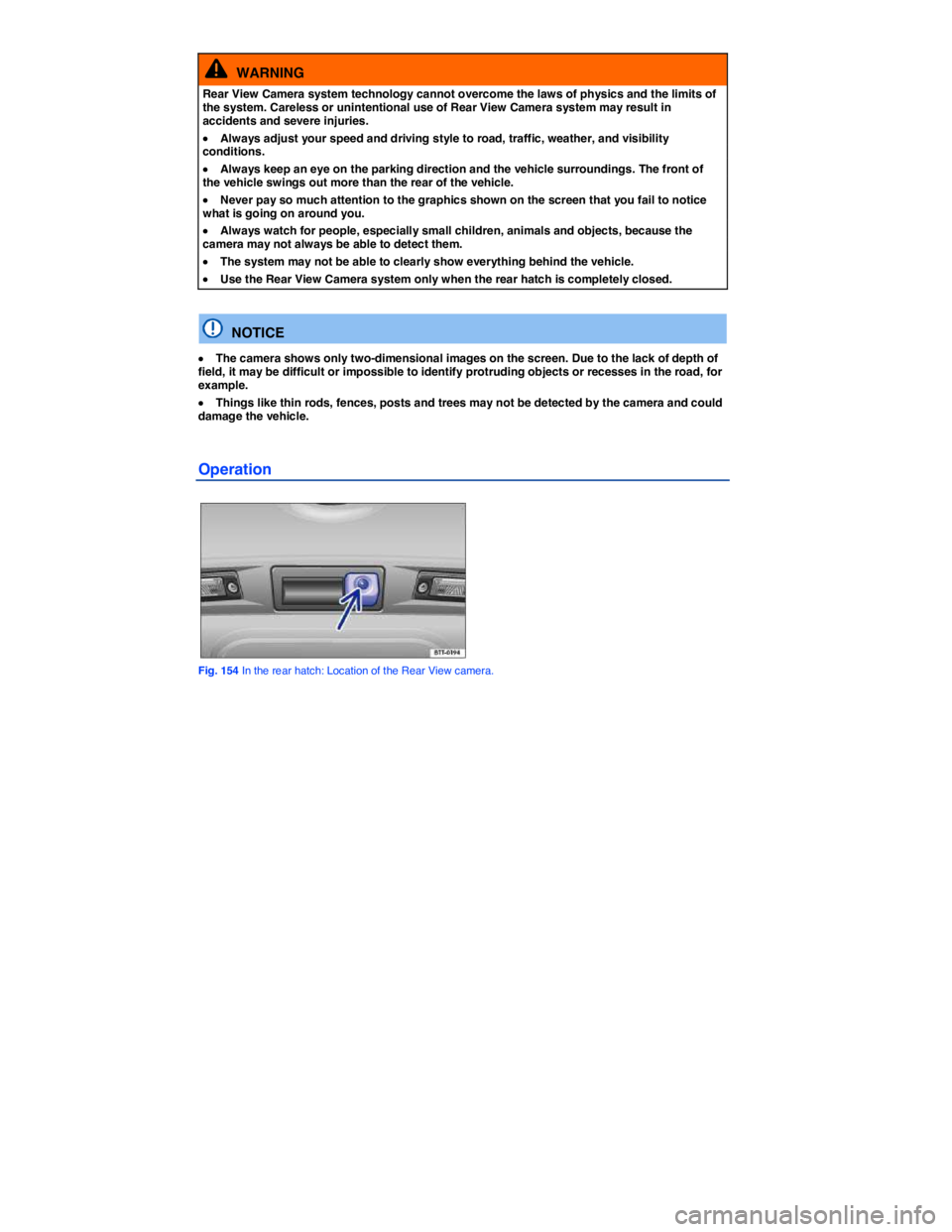2015 VOLKSWAGEN TIGUAN warning
[x] Cancel search: warningPage 258 of 435

automatically switches off to keep the brake from overheating. As soon as the brake has cooled down, EDL automatically switches on again.
WARNING
Driving fast on icy, slippery, or wet roads can lead to a loss of control and result in serious personal injury for you and your passengers.
�x Always adjust your speed and driving style to road, traffic, weather, and visibility conditions. Never let the additional safety that ESC, ABS, BAS, ASR, and EDL can provide tempt you into taking extra risks.
�x Braking assistance systems cannot overcome the laws of physics and always prevent loss of vehicle control. Slippery and wet roads are still dangerous even with ESC and the other systems!
�x Driving too fast on wet roads can cause the wheels to lose contact with the road and “hydroplane.” A vehicle that has lost road contact cannot be braked, steered, or controlled.
�x These systems cannot reduce the risk of accident, for example if you drive too fast for conditions or if you do not keep your distance from the vehicle in front of you.
�x Although these systems are very effective and can help you control the vehicle in many difficult situations, always remember that your vehicle handling control is limited by tire traction.
�x When accelerating on a slippery surface, for example on ice and snow, depress the accelerator carefully. Even with these systems, the wheels may start to spin, leading to a loss of vehicle control.
WARNING
The effectiveness of ESC can be significantly reduced if other components and systems that affect vehicle dynamics, including but not limited to brakes, tires, and other systems mentioned above, are not properly maintained or functioning.
�x Always remember that vehicle alterations or modifications can affect the functioning of the ABS, BAS, ASR, EDL and ESC systems.
�x Changing the vehicle suspension or using an unapproved tire/wheel combination can change the way the ABS, BAS, ASR, EDL and ESC systems work and reduce their effectiveness.
�x The effectiveness of ESC is also determined by the tires fitted ⇒ Tires and wheels.
All 4 wheels must be equipped with identical tires in order for ESC and ASR to work properly. Differences in the tread circumference of the tires can cause the system to reduce the engine power when it is not expected.
If ABS is not working, ESC, ASR, and EDL will also not work.
You may hear noises when these systems are active.
Page 260 of 435

Brake fluid specifications
Volkswagen has developed a special brake fluid that is optimized for the brake system in your Volkswagen. Volkswagen recommends that you expressly use brake fluid that conforms to quality standard VW Standard 501 14 for optimum performance of the brake system. Check the information on the container for the brake fluid you want to use to make sure it meets the requirements for your vehicle.
Brake fluid that complies with VW Standard 501 14 can be purchased from your authorized Volkswagen dealer or authorized Volkswagen Service Facility.
If this special brake fluid is not available you may – under these circumstances – use another high-quality brake fluid that complies with U.S. Federal Motor Vehicle Safety Standard (FMVSS) 116 DOT 4
⇒ .
Please note, however, that not all brake fluids that comply with U.S. Federal Motor Vehicle Safety Standard FMVSS 116 DOT 4 have the same chemical composition. Some of these brake fluids can contain chemicals that could, over time, degrade or damage internal parts of the vehicle’s brake system.
Volkswagen therefore recommends that you use brake fluid that expressly complies with VW Standard 501 14 for optimum brake system performance over the long term.
Brake fluid level
The fluid level in the transparent brake fluid reservoir must always be between the MIN and MAX
marking ⇒ .
On some vehicles, engine components block the view of the brake fluid reservoir and make it impossible to see the brake fluid level. If you cannot clearly see the brake fluid level in the brake fluid reservoir, please see an authorized Volkswagen dealer or authorized Volkswagen Service Facility.
The brake fluid level drops slightly when the vehicle is being used as the brake pads wear and the brakes are automatically adjusted.
Changing brake fluid
Brake fluid must be changed according to the service schedule in your ⇒ Booklet Warranty and
Maintenance. Have the brake fluid checked by an authorized Volkswagen dealer or an authorized Volkswagen Service Facility. Refill only with new brake fluid that meets the standards listed above.
WARNING
Brake failure and reduced brake performance can be caused by not having enough brake fluid in the reservoir or by old or incorrect brake fluid.
�x Check the brake system and brake fluid level regularly.
�x Always change the brake fluid according to the service schedule in your
⇒ Booklet Warranty and Maintenance.
�x Hard braking with old brake fluid may cause vapor lock. Vapor lock reduces braking performance, increases stopping distances and can even cause total brake failure.
�x Always make sure that only the correct brake fluid is used. Only use brake fluid that expressly conforms to VW Standard 501 14 or if it is not available, only use a high-quality brake fluid that conforms to U.S. Standard FMVSS 116 DOT 4 requirements.
�x Using another brake fluid, or one that is not of high quality, can impair the function of the brake system and reduce its effectiveness. If the container does not say that the brake fluid complies with VW Standard 501 14, or U.S. Standard FMVSS 116 DOT 4, do not use it.
�x The brake fluid must be new.
Page 261 of 435

WARNING
Brake fluid is poisonous.
�x To reduce the risk of poisoning, never use food, beverage or other non-original containers to store brake fluid. Someone might be misled by the original label on the container, or by the shape of the container, and drink the brake fluid. This could occur even if you relabel the container as “brake fluid.”
�x Only store brake fluid in the closed, original container and keep it out of the reach of children.
NOTICE
Brake fluid will damage vehicle paint, plastic parts and tires. Wipe any brake fluid off vehicle paint and other vehicle parts immediately.
Brake fluid can pollute the environment. Brake fluid that has leaked out must be collected and disposed of properly, following all applicable environmental regulations.
Page 267 of 435

Display
Different cruise control versions are available. The stored speed is shown in the instrument cluster display on some equipment versions.
Status fig. 149
(A) Cruise control temporarily deactivated. Stored speed in small numbers.
(B) System malfunction. See an authorized Volkswagen dealer or an authorized Volkswagen Service Facility.
(C) Cruise control activated. No speed stored in memory.
(D) Cruise control is active. Stored speed in large numbers.
Indicator lights
Lights up Possible cause
�% Cruise control is regulating the speed. �#�2�5�)�3�%
When the ignition is switched on, several warning and indicator lights come on briefly for a function check. They go out after a few seconds.
WARNING
Failure to heed warning lights and instrument cluster text messages can cause the vehicle to break down in traffic and result in a collision and serious personal injury.
�x Never ignore warning lights or text WARNINGS.
�x Always stop the vehicle as soon as it is safe to do so.
NOTICE
Failure to heed warning lights or text WARNINGS can result in vehicle damage.
Cruise control operation
Fig. 150 On the left side of the steering column: Cruise control buttons and switches.
�
Page 274 of 435

WARNING
Rear View Camera system technology cannot overcome the laws of physics and the limits of the system. Careless or unintentional use of Rear View Camera system may result in accidents and severe injuries.
�x Always adjust your speed and driving style to road, traffic, weather, and visibility conditions.
�x Always keep an eye on the parking direction and the vehicle surroundings. The front of the vehicle swings out more than the rear of the vehicle.
�x Never pay so much attention to the graphics shown on the screen that you fail to notice what is going on around you.
�x Always watch for people, especially small children, animals and objects, because the camera may not always be able to detect them.
�x The system may not be able to clearly show everything behind the vehicle.
�x Use the Rear View Camera system only when the rear hatch is completely closed.
NOTICE
�x The camera shows only two-dimensional images on the screen. Due to the lack of depth of field, it may be difficult or impossible to identify protruding objects or recesses in the road, for example.
�x Things like thin rods, fences, posts and trees may not be detected by the camera and could damage the vehicle.
Operation
Fig. 154 In the rear hatch: Location of the Rear View camera.
Page 280 of 435

WARNING
Poor visibility increases the risk of collisions and other accidents that cause serious personal injuries.
�x Always make sure all windows are clear of ice, snow and condensation for good visibility to the front, sides, and rear.
�x Maximum heating output and defrosting performance are not possible until the engine has reached operating temperature. Wait until you have good visibility before driving off.
�x Always make sure you know how to properly use the heating and ventilation systems as well as the rear window defroster that you will need for good visibility.
�x Never use air recirculation for long periods of time. When the air conditioner is off and recirculation mode is on, condensation can quickly form on the windows and greatly reduce visibility.
�x Always switch off recirculation mode when it is not needed.
WARNING
Stale air causes driver fatigue and reduces driver alertness, which can cause accidents, collisions and serious personal injury.
�x Never switch off the fan for a long period of time and never use air recirculation a long period of time because no fresh air will enter the passenger compartment.
NOTICE
�x If you think the air conditioner is not working properly or may be damaged, switch it off to help prevent more damage. Have the air conditioner checked by an authorized Volkswagen dealer or authorized Volkswagen Service Facility.
�x Air conditioner repair requires specialized knowledge and special tools. Volkswagen recommends that you see an authorized Volkswagen dealer or an authorized Volkswagen Service Facility.
�x Do not smoke when air recirculation is switched on. Smoke drawn into the ventilation system can leave residue on the evaporator and on the dust and pollen active carbon filter, resulting in permanent odors whenever the air conditioner is switched on.
If the air conditioner is switched off, the fresh outside air will not be dehumidified. To help keep the windows from fogging over, Volkswagen recommends leaving the air conditioner (compressor) switched on. Press the AC button. The indicator light in the button must come on.
When it is very hot and humid outside, water condensation can drip from the air conditioner evaporator and form a puddle under the vehicle. This is normal and does not indicate a leak.
Keep the air intake slots in front of the windshield free of ice, snow and leaves in order to maintain proper functioning of the heating and ventilation systems.
Maximum heating output and defrosting performance are not possible until the engine has reached operating temperature.
Page 284 of 435

Button / Knob More information: Climatronic ⇒ fig. 159.
Press the button: The �!�5�4�/ High (high fan speed) function switches on. The right indicator light in the button lights up. Press the button again: The �!�5�4�/ Low (low blower speed) function switches on. The left indicator light in the button lights up.
�/�&�& Switching off. Press �/�&�& button or set the fan manually to 0. If the system is switched off, an indicator light in the �/�&�& button lights up.
WARNING
Stale air causes driver fatigue and reduces alertness, which can cause accidents, collisions, and serious personal injury.
�x Never switch off the fan for a long time, because no fresh air will enter the passenger compartment.
Operation
�
Page 288 of 435

WARNING
Stale air causes driver fatigue and reduces driver alertness, which can cause accidents, collisions and serious personal injury.
�x Never use air recirculation mode over an extended period of time, since no fresh air will enter the passenger compartment.
�x When the air conditioner is off and recirculation mode is on, condensation can quickly form on the windows and greatly reduce visibility.
�x Always switch off recirculation mode when it is not needed.
NOTICE
Do not smoke when air recirculation is switched on. Smoke drawn into the ventilation system can leave residue on the evaporator and on the dust and pollen active carbon filter, resulting in permanent odors whenever the air conditioner is switched on.
Climatronic: When backing up and while the automatic wiper/washer is operating, air recirculation is briefly activated to help keep exhaust fumes from getting into the passenger compartment.